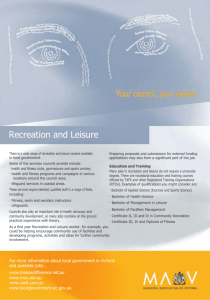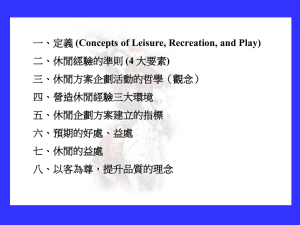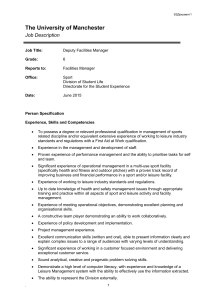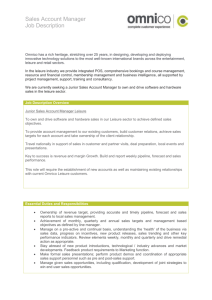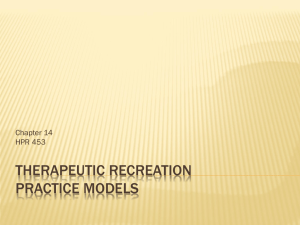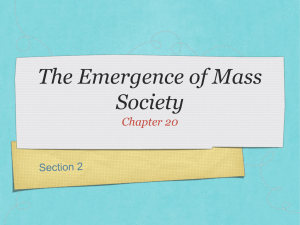SPTM 223: Principles of Recreation
advertisement
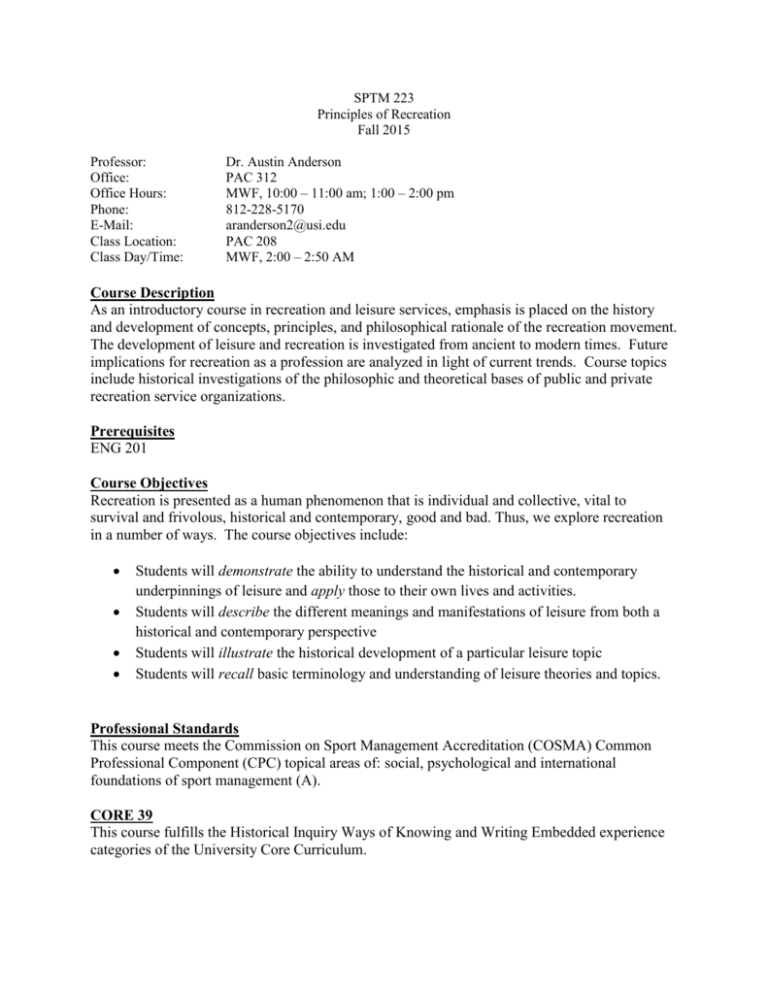
SPTM 223 Principles of Recreation Fall 2015 Professor: Office: Office Hours: Phone: E-Mail: Class Location: Class Day/Time: Dr. Austin Anderson PAC 312 MWF, 10:00 – 11:00 am; 1:00 – 2:00 pm 812-228-5170 aranderson2@usi.edu PAC 208 MWF, 2:00 – 2:50 AM Course Description As an introductory course in recreation and leisure services, emphasis is placed on the history and development of concepts, principles, and philosophical rationale of the recreation movement. The development of leisure and recreation is investigated from ancient to modern times. Future implications for recreation as a profession are analyzed in light of current trends. Course topics include historical investigations of the philosophic and theoretical bases of public and private recreation service organizations. Prerequisites ENG 201 Course Objectives Recreation is presented as a human phenomenon that is individual and collective, vital to survival and frivolous, historical and contemporary, good and bad. Thus, we explore recreation in a number of ways. The course objectives include: Students will demonstrate the ability to understand the historical and contemporary underpinnings of leisure and apply those to their own lives and activities. Students will describe the different meanings and manifestations of leisure from both a historical and contemporary perspective Students will illustrate the historical development of a particular leisure topic Students will recall basic terminology and understanding of leisure theories and topics. Professional Standards This course meets the Commission on Sport Management Accreditation (COSMA) Common Professional Component (CPC) topical areas of: social, psychological and international foundations of sport management (A). CORE 39 This course fulfills the Historical Inquiry Ways of Knowing and Writing Embedded experience categories of the University Core Curriculum. Required Text Russell, Ruth V. (2009). Pastimes—The context of contemporary leisure. (5th ed.). Champaign, IL: Sagamore. Top Hat Service Subscription (details will be covered on first day of class) Attendance Policy Regular attendance and participation is required. Each student will be allowed three (3) unexcused absences. After the Universities schedule revision period is over, a final roll sheet will be created. Roll will be taken prior to the beginning of each class. If there are extenuating circumstances and you may have to leave class early, please let me know prior to the class period, otherwise an early departure will be considered an unexcused absence. Excessive (more than two) unexcused absences will be taken into account and may affect your class grade. Technology Expectations All assignments are to be word-processed. No hand-written assignments will be accepted. Blackboard The student must be familiar with Blackboard in order to access documents relevant to this course (i.e, PowerPoint presentations, assignments, grades). E-Mail Each student is required to have an email account. Please check your email at least once a day for any new information regarding this class. You are responsible for monitoring your e-mail messages. Periodically notification of assignments will be sent via e-mail. USI provides free email accounts for all enrolled students. Failure to regularly respond to e-mail messages could result in an unsatisfactory grade for this course. In-Class Technology Cell phones are NOT appropriate for in-class use. When you come into classes, phones should be disabled (i.e. turned off) and put away (in a bag) for the duration of the class session. Any use of cell phones during class lecture and activities will be considered grounds for dismissal from class and could negatively impact your evaluation. Laptop computers and tablets can be accessed for in-class use when working on activities and/or taking notes. HOWEVER, if it becomes clear that students are not utilizing their devices for these purposes, these may be banned for in-class use as well. If you have a particular issue or situation which may require you to use technology during one or more class sessions, please see the instructor to discuss those issues after class on the first class session, or as any such issues may arise. Assignments Experiential Projects: A series of activities illustrating and integrating course material is offered. Each project contains two parts: an in-class participatory exercise and a homework assignment. Both parts must be completed to receive credit. Projects include case studies, small group discussions, writing, investigations, and web & media interaction. Absence and/or tardiness to class will preclude you from participating in experiential project work during that class period. 7 projects will be offered throughout the semester, and you must complete 5. Group Discussion Days: On selected Fridays, in lieu of lecture, class will be held in a discussion format for class-wide discussion of selected topics, cases, examples, and concepts. Students will receive points for thoughtful contribution to those group discussions. Students will also be asked to lead discussions on selected days. Historical Research Paper: Students will construct an argument paper exploring the history and development of one recreation-related issue in an in-depth manner. Students may use lectures, text readings, interviews, observations, library, and academic resources to collect information. Findings should be summarized in a historical research paper of six (6) double spaced pages. This paper assignment will consist of the development and submission of three separate components for feedback prior to the completed paper submission. These components consist of an annotated bibliography, a thesis statement and introduction of the paper, and a 3 page draft including detail of the primary historical issues. Students will receive instruction and guidance on the development of these components throughout the course. The paper should be written in APA Style (6th edition) and contain a separate reference page with at least 6 primary sources. Pop Quizzes: Pop quizzes from the readings, in class activities, and lecture. Quizzes will be unannounced and may take place at any time during any class period. If you are not present (tardy), you will not have the opportunity to earn these points. Pop quizzes may only be made up for justified absences due to university sponsored events and the instructor has been notified prior to the absence. Midterm: There will be a Midterm Examination given in this course. It will cover all materials presented in this class from the beginning of the semester until the midpoint of the semester. This includes readings from the book, lecture notes, and information on quizzes. The Midterm will be a closed-book exam. Final Exam: The Final Exam will be much like the Midterm. The Final will not be cumulative. It will cover materials presented after the midpoint of the semester. This includes readings from the book, lecture notes, and information on quizzes. The Final will be a closed-book exam. Grades A B+ B C+ C D+ D F 90 – 100% 88 – 89% 80 – 87% 78 – 79% 70 – 77% 68 – 69% 60 – 67% 59 % and Below Experiential Projects: Written Exams (2): Argument Paper: Group Discussion: Pop Quizzes 75 200 150 70 50 Total Points: 545 Final grades will not be rounded to nearest percentage PLEASE NOTE: All scores for graded assignments will be placed on Blackboard as expediently as possible once they are submitted. Once grades are posted, the class will be informed either via email or with an in-class announcement. Once the class is informed of the grade posting, students should approach the instructor with any questions about the score within 48 HOURS. After the 48 hour period, posted scores will be “final”. COURSE CALENDAR Note: Chapter readings should be done prior to the class for which they are assigned. Part One: Leisure as a Condition of Being Human – Personal Context August 24 Course Introduction 26 Ch. 1--Contemporary Meanings (pages 20 – 23) 28 Ch. 1—Classical Meanings (pages 9 – 20) 31 Ch. 1—Meanings in the Humanities (pages 4 – 9) September 2 Ch. 2—The Value of Having Fun (Leisure Qualities) 4 Ch. 2—The Value of Having Fun (Leisure Qualities) 7 NO CLASS—LABOR DAY 9 Ch. 3—Explaining Leisure Behavior—Situational Factors Annotated Bibliography Due 11 Group Discussion Day 1 14 Ch. 3—Explaining Leisure Behavior—Theoretical Explanations 16 Jill Bolte Taylor Movie 18 NRPA In Class Assignment 21 Ch. 4—Leisure and Well Being Part Two: Leisure as a Cultural Mirror – Societal Context 23 Ch. 5—Leisure’s Anthropology 25 Group Discussion Day 2 28 Ch. 5—Leisure’s Anthropology (Cultural Impact) 30 Ch. 6—Leisure’s Geography October 2 Ch. 6—Leisure’s Geography (Environmental Impact) 5 Exam 1 Review 7 EXAM 1 9 Group Discussion Day 3 12 No Class—Fall Break 14 Ch. 7—Leisure and Technology Intro/Thesis Statement Due 16 Modern Marvels: Disney World 19 Modern Marvels: Disney World 21 Ch. 8--Popular Culture (TV and Film) 23 Ch. 8--Popular Culture (TV and Film) 26 Ch. 8—Popular Culture (Amusement) 28 Ch. 9—Taboo Recreation (Leisure as Deviance) 30 Group Discussion Day 4 November 2 Ch. 9—Taboo Recreation (Leisure as Deviance) 4 Ch. 9—Taboo Recreation (The Dilemma of Goodness) 3 Page Draft Due 6 Group Discussion Day 5 Part Three: Leisure as Instrument – Systems Context 9 Ch. 10—For and Against Productivity (Leisure and Work) 11 Ch. 10—For and Against Productivity (Leisure and Consumption) 13 Group Discussion Day 6 16 Ch. 10—For and Against Productivity (Leisure and Economic Impact) 18 Ch. 11—The Freedom and Tyranny of Time 20 Group Discussion Day 7 23 Ch. 12—Is Leisure Fair? 30 Leisure and Inequity December 2 Leisure and Inequity: The University Pool Historical Research Paper Due 4 Ch. 13—Leisure Systems 7 Exam 2 Review December 11th EXAM 2 OTHER IMPORTANT INFORMATION Inclement Weather The University has a weather alert system (RAVE). Students can sign up at http://www.usi.edu/emergency/alerts.asp and receive accurate and timely text information about weather related decisions - whether the university is open or closed for business. In the case of inclement weather, students need to exercise sound judgment about driving to class and make a decision based on their safety first. H1N1 flu In compliance with the Vanderburgh County Department of Health, the Indiana Department of Health, and the Centers for Disease Control and Prevention recommendations, students should NOT attend class or any campus gatherings while ill with flu symptoms. Students with flu symptoms will be asked to self isolate in housing or go home. It is very important that individuals avoid spreading the flu to others. Most students should be able to complete a successful semester despite a flu-induced absence. Faculty may provide students, who are absent because of illness, with alternate methods of instruction and a reasonable opportunity to make up missed work. The opportunity to complete assignments and exams supports the University's desire to enable students to make responsible decisions, including the decision to avoid spreading a contagious virus to other students, staff, and faculty, without endangering their academic work. Students should arrange as quickly as possible to make up missed assignments or exams. In case of faculty illness, an announcement will be made related to an alternate instruction delivery plan. Students should inform their instructor by email as soon as possible that they are absent because of flu symptoms and report their flu-like symptoms on the Student Health Center web page www.usi.edu\studenthealth Information about the H1N1 flu can be found at the USI web site http://www.usi.edu/emergency ADA Accommodations If you have a disability for which you may require academic accommodations for this class, please register with Disability Resources (DR) as soon as possible. Students who have or who receive an accommodation letter from DR are encouraged to meet privately with course faculty to discuss the provisions of those accommodations as early in the semester as possible. To qualify for accommodation assistance, students must first register to use the disability resources in DR, Orr Center Rm. 095, 812-464-1961 http://www.usi.edu/disabilities. To help ensure that accommodations will be available when needed, students are encouraged to meet with course faculty at least 7 days prior to the actual need for the accommodation. Academic Dishonesty (USI 2011-2013 Bulletin, 2011, p. 34) Academic dishonesty, including plagiarism, cheating, submitting another person’s material as one’s own, or doing work for which another person will receive credit will subject a student to disciplinary action which may include dismissal from the University. The benchmarks of any great university are high academic standards for both faculty and students. For this reason, truth and honesty are necessary to a university community. The University expects both students and faculty to adhere to these principles and to foster them daily. Put simply, this expectation requires each student to do his or her academic work without recourse to unauthorized means of any kind. Both students and faculty are expected to report instances of academic dishonesty. Faculty should explain the special hazards regarding academic honesty in their discipline. Faculty should also plan and supervise academic work carefully so honest effort will be encouraged. All of the prohibitions mentioned below also apply to the use of electronic, photographic, Internet-based, and other media for intellectual and artistic expression”. Cheating (USI 2011-2013 Bulletin, 2011, p. 279-280) A student must not intentionally use or attempt to use unauthorized materials, information, or study aids in any academic exercise. 1. A student must not use external assistance during any examination unless the instructor has specifically authorized such assistance. This prohibition includes (but is not limited to) the use of tutors, books, calculators, notes, formula lists, cues on a computer, photographs, and symbolic representations. Prohibition also includes transmission of information on any recording or communication device, such as cellular telephone, Internet appliance, digital camera, audio recorder, or personal digital assistant. 2. A student must not copy from another student’s work, including (but not limited to) a test paper, project, product, performance, or electronic document or file. 3. A student must not take a test for someone else or permit someone else to take a test for him or her. A student must not knowingly allow another student to copy one’s work in a test. 4. A student must not submit, during the same semester, substantial portions of the same academic work for credit or honors more than once without permission from all of the instructors who may be involved. In the event a student seeks to submit in a current course a substantial portion of the same academic work submitted in a previous course, then only the current instructor need approve. 5. A student must not allow others to conduct research or to prepare any work for him or her without advance authorization from the instructor. This prohibition includes (but is not limited to) submitting another’s work as one’s own, or using commercial term-paper companies or files of past papers maintained in a residence hall or apartment. 6. Several people must not collaborate on a single project and turn in multiple copies, all represented implicitly or explicitly as individual work. Fabrication (USI 2011-2013 Bulletin, 2011, p. 280) A student must not intentionally falsify or invent any information or citation in an academic exercise. Plagiarism (USI 2011-2013 Bulletin, 2011, p. 80) A student must not intentionally adopt or reproduce ideas, words or statements of another person without acknowledgment. A student must give due credit to the originality of others and properly reference the following: 1. Quoting another persons’ actual words; 2. Using another person’s ideas, opinion or theory; 3. Borrowing facts, statistics, or other illustrative material, unless the information is common knowledge. Interference (USI 2011-2013 Bulletin, 2011, p. 280) A student must not steal, change, destroy, or impede another student’s work. Impeding another student’s work includes (but is not limited to) theft, defacement, or mutilation of common resources so as to deprive others of the information they contain. Facilitating Academic Dishonesty (USI 2011-2013 Bulletin, 2011, p. 280) A student must not intentionally or knowingly help or attempt to help another to commit an act of academic dishonesty. Penalties and Procedures Related to Academic Misconduct (USI 2011-2013 Bulletin, 2011, p. 280) An act of academic misconduct, even a first offense, places the student in jeopardy of the most severe form of sanction— expulsion from the University. A. A faculty member who has observed an act of dishonesty or has other evidence that a student has committed an act prohibited in Section 3.1 shall initiate the process of determining whether the student is in violation of the policy. No penalty shall be imposed until the student has been informed of the charge, has been informed of the evidence on which it is based, and has been given an opportunity to respond. B. If the faculty member finds by a preponderance of the evidence the student to be in violation of the academic honesty policy, he or she may assess a penalty affecting the specific project, paper, or test in which the act is found to have occurred. The student may appeal this penalty to the department chair. 1. If the faculty member wishes to impose a more severe academic penalty (for example, to give a course grade of “F”), he or she will review the incident with the department chair prior to the imposition of the penalty. If the chair concurs with the penalty, the student may appeal to the dean of the college in which the course is taught. 2. In the event the department chair is the instructor of the course, he or she will review the incident with the dean prior to the imposition of the penalty. If the dean concurs with the penalty, the student may appeal to the provost. 3. In the event the dean is the instructor of the course, he or she will review the incident with the provost prior to the imposition of the penalty. If the provost concurs with the penalty, the student may appeal to the provost’s designee. C. In all cases where a penalty has been imposed, the faculty member will file the Academic Dishonesty Report Form with the department chair who will forward the report to the dean of the college with a copy to the Office of the Dean of Students. If the student is not enrolled in the college or institution in which the course is offered, the dean of that college or institution will provide a copy of the report to the dean of the college in which the student is enrolled or to the institution of record. D. If the department chair and/or dean of the college or institution in which the student is enrolled believe that further action is warranted, additional penalties may be imposed. The department chair may remove the student from the academic major, following review and approval by the dean of the college; the student may appeal this penalty to the provost. The dean may remove the student from the academic college, following review and approval by the provost; the student may appeal this penalty to the Student Academic Grievance Committee. E. Any appeal by a student of a decision herein must be made within 14 calendar days of notification of the decision. F. In addition to academic penalties, additional university sanctions up to and including suspension and expulsion may be applied when charges are filed under the Student Rights and Responsibilities: a Code of Student Behavior.

